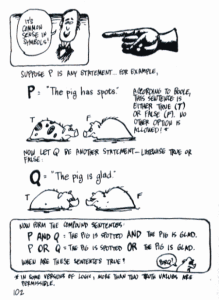Want To Be The Next Larry Gonick?¹
Two items today, one long and one short.
- Know what I really like about webcomickers?
When presented with the opportunity to seek out creative partners for a new project, they pay. Consider the vast amounts of money doled out by your Spikes, or Erikas Moen, who are in the habit of retroactively paying artists bonuses, or your Ryans North, who regard increasing income primarily as a reason to hire more artists. Consider the vitriol among webcomickers inspired by the quotes that Ryan Estrada mines for the @forexposure_txt twitterfeed.
So it gives me great pleasure to point out another project announcement, one that pays money (probably). Welcome to the world of research grants with your guide, Dante Shepherd:
This is what I want to do. I want to make science comics. And I want to pay artists to make them.
I’m currently applying for a grant to help these visual students learn. While the overall grant isn’t for a ton of money in comparison to the usual research grants, it would be enough to pay artists for at least 60 pages of work. These 60 pages would be spread across several disciplines — certainly Chemical Engineering, with it being my background, but also Civil Engineering, Electrical Engineering, Biology, and more — and would ideally be a springboard for us to be able to continue adding to the comic education in future years as well.
And as part of this grant, we would also involve Art and Design students to further their education, too. It’d be as expansive as we can make it for the funds provided to us.
This is where I’m opening it up to you and any other artists out there for involvement. We need to show that we have actual professional artists interested and willing to participate in the grant. The work would be collaborative to some extent — the engineering researchers, the art and design researchers, and artists all working together to develop optimal scripts and layouts for learning — and you would be paid for your work based on the pages you produce.
I know that sounds a little convoluted, so let me summarize: the money doesn’t exist yet, and in order to get the money, artists are needed to say that they would be interested in doing the work. If the money doesn’t come through (and writing grants is not a guarantee of success²), then you don’t do the work. It’s more than a little chasing-your-own-tail, what with needing people willing to do the work, not knowing if they’ll actually be called upon to do it, but without that first step nothing will happen.
So if you’re interested, if you think you could help teach complex STEM principles in comics form, if you’re willing to to show your past work to help convince the grant committee, drop an email to danteshepherd who has taken out a Google email account.
- In other news, we’ve previously mentioned that the annual MoCCA Fest will be shifting venues to Center 548, and it appears that the new locale is just a mite too small to accommodate panels. Not to fear, as the Society of Illustrators (parent organization to MoCCA) have obtained two dedicated rooms at the nearby (and gorgeous) High Line Hotel, a brief walk of perhaps four minutes. Also, you know what you get with hotels that you don’t get other places? Lobby bars. Just sayin’.
Spam of the day:
prepared dishes that you would come to expect from an iron chef, because it wasn’t. It just wasn’t. Wasn’t worth
Iron Chefs are always worth it.
________________
¹ Larry Gonick has taught more people about more different things using cartoons than anybody else I can think of. As previously noted, pretty much everything I know about the history of China is due to his comics.
I became an electrical engineer specializing in communication systems and information theory at least in part because I had a copy of the 1983 edition of The Cartoon Guide to Computer Science (since retitled) back in high school and learned about Turing, Shannon, and other giants of the field. Hell, I stole his AND and OR truth tables on the statements P: The pig has spots and Q: The pig is glad when I was teaching computer logic early in my career. The lesson was worth it just for the PorQ? joke.
² Although the relatively low cost of paying some artists to produce comics compared to — let’s say, building a multi million dollar materials-research lab — help the odds. If you’ve got ten grand left over in your funding and here are fourteen unmet grants looking for multiple millions and one over there looking for eight grand, that becomes a no-brainer.

Thanks for this! I just popped Dante an email to see if I can help him in any way (more on the science side than the art I suspect).
By David Morgan-Mar on 01.24.15 11:06 pm
The above comments are owned by whoever posted them. The staff of Fleen are not responsible for them in any way.